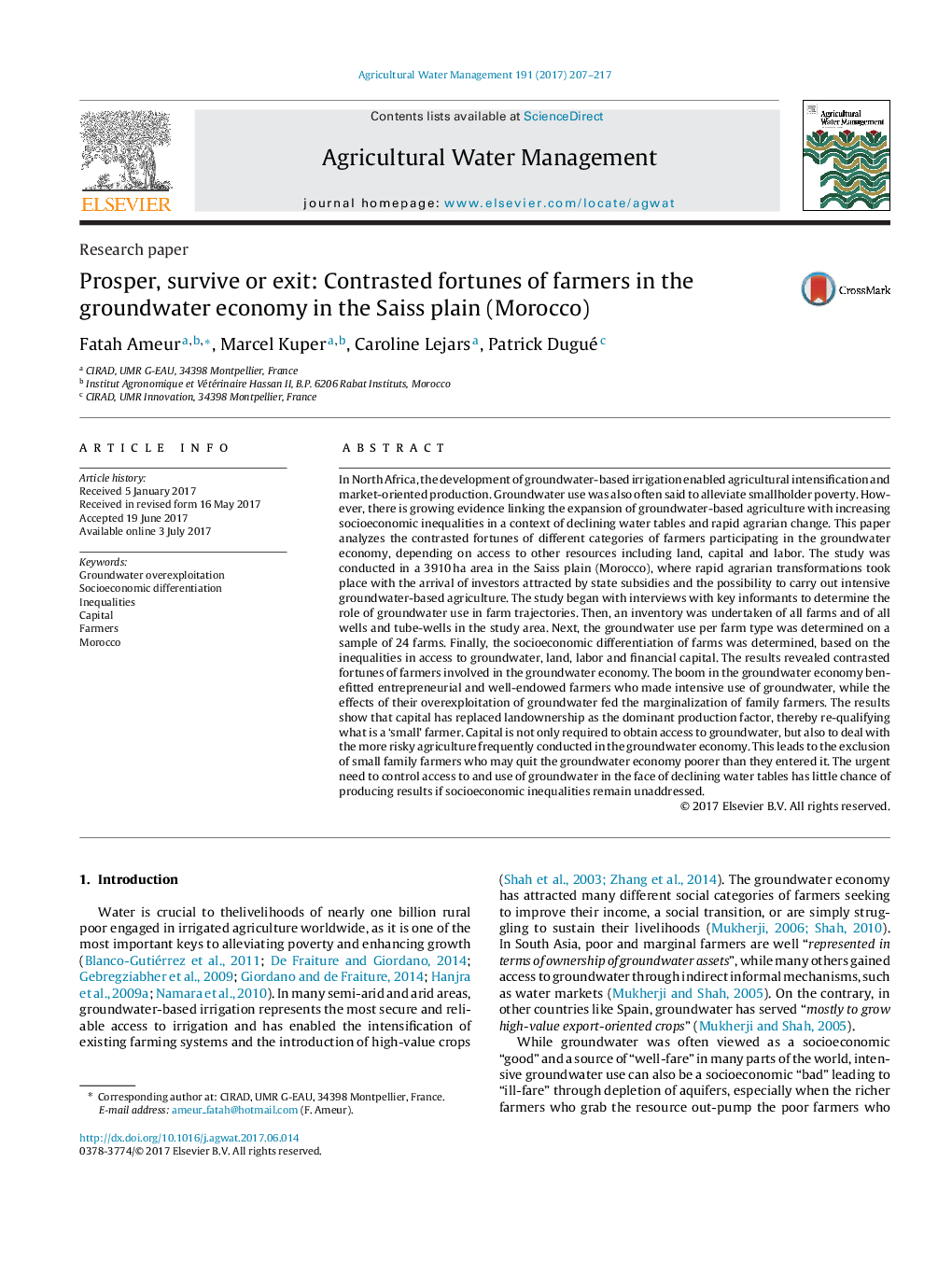| کد مقاله | کد نشریه | سال انتشار | مقاله انگلیسی | نسخه تمام متن |
|---|---|---|---|---|
| 5758306 | 1622889 | 2017 | 11 صفحه PDF | دانلود رایگان |
عنوان انگلیسی مقاله ISI
Prosper, survive or exit: Contrasted fortunes of farmers in the groundwater economy in the Saiss plain (Morocco)
ترجمه فارسی عنوان
خوشبختی، زنده ماندن یا خروج: ثروت متعادلی کشاورزان در اقتصاد آبهای زیرزمینی در دشت سایس (مراکش)
دانلود مقاله + سفارش ترجمه
دانلود مقاله ISI انگلیسی
رایگان برای ایرانیان
کلمات کلیدی
بیش از حد استفاده از آبهای زیرزمینی، تمایز اجتماعی و اقتصادی، نابرابری، سرمایه، پایتخت، کشاورزان، مراکش،
موضوعات مرتبط
علوم زیستی و بیوفناوری
علوم کشاورزی و بیولوژیک
علوم زراعت و اصلاح نباتات
چکیده انگلیسی
In North Africa, the development of groundwater-based irrigation enabled agricultural intensification and market-oriented production. Groundwater use was also often said to alleviate smallholder poverty. However, there is growing evidence linking the expansion of groundwater-based agriculture with increasing socioeconomic inequalities in a context of declining water tables and rapid agrarian change. This paper analyzes the contrasted fortunes of different categories of farmers participating in the groundwater economy, depending on access to other resources including land, capital and labor. The study was conducted in a 3910Â ha area in the Saiss plain (Morocco), where rapid agrarian transformations took place with the arrival of investors attracted by state subsidies and the possibility to carry out intensive groundwater-based agriculture. The study began with interviews with key informants to determine the role of groundwater use in farm trajectories. Then, an inventory was undertaken of all farms and of all wells and tube-wells in the study area. Next, the groundwater use per farm type was determined on a sample of 24 farms. Finally, the socioeconomic differentiation of farms was determined, based on the inequalities in access to groundwater, land, labor and financial capital. The results revealed contrasted fortunes of farmers involved in the groundwater economy. The boom in the groundwater economy benefitted entrepreneurial and well-endowed farmers who made intensive use of groundwater, while the effects of their overexploitation of groundwater fed the marginalization of family farmers. The results show that capital has replaced landownership as the dominant production factor, thereby re-qualifying what is a 'small' farmer. Capital is not only required to obtain access to groundwater, but also to deal with the more risky agriculture frequently conducted in the groundwater economy. This leads to the exclusion of small family farmers who may quit the groundwater economy poorer than they entered it. The urgent need to control access to and use of groundwater in the face of declining water tables has little chance of producing results if socioeconomic inequalities remain unaddressed.
ناشر
Database: Elsevier - ScienceDirect (ساینس دایرکت)
Journal: Agricultural Water Management - Volume 191, September 2017, Pages 207-217
Journal: Agricultural Water Management - Volume 191, September 2017, Pages 207-217
نویسندگان
Fatah Ameur, Marcel Kuper, Caroline Lejars, Patrick Dugué,
